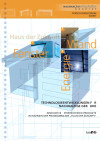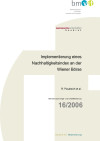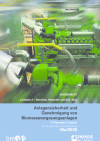Suchergebnisse
Exkursion und Internationaler Workshop „Entwicklungen im Schulbau“
08. Februar 2017
Wartingersaal, Karmeliterplatz 3, 8010 Graz
AEE – Institut für Nachhaltige Technologien veranstaltet gemeinsam mit dem Holzcluster Steiermark eine Exkursion zu zwei innovativ neu gebauten Schulen in und um Graz und einen Internationalen Workshop zum Thema „Entwicklungen bei Schulsanierungen in Europa – Finanzierung, Vorfertigung, Energieeffizienz und Lüftung“.
Research & Innovation Needs for Smart Grid Transition
29. March 2017
Webinar, Vienna, AT
ISGAN, the International Smart Grid Action Network, Annex 7 - Smart Grid Transition, holds a no-cost webinar on research and innovation needs for smart grid transition.
Webinar - The European Wood Pellet Market for Small-Scale Heating
14. March 2017
Online, AT
In this webinar we summarise the findings of an extensive quantitative wood pellet market analysis based on trade flow data, price developments over time, exchange rate fluctuations and temperature data. The market study was performed within the IEA Bioenergy Task 40 for international bioenergy trade.
Advanced Lighting Solutions for Retrofitting Buildings
21. März 2017
online
Als eine der Maßnahmen zur Verbreitung der Ergebnisse von IEA Solar Heating and Cooling Tasks bietet das IEA SHC Programm eine Serie von Webinars an. Das erste Webinar im Rahmen der der Solar Academy widmet sich den Ergebnissen der Task 50 "Advanced Lighting Solutions for Retrofitting Buidlings".
Algen als biogene Ressource - Forschung in Österreich
11. September 2014
EVN Kraftwerk Dürnrohr, Kraftwerksstrasse 1, 3435 Zwentendorf an der Donau
Am 11. September 2014 fand beim EVN-Kraftwerk Dürnrohr in Zwentendorf im Rahmen des Netzwerks Algen der zweite „Vernetzungsworkshop Algen“ statt. Ziel des Workshops war es, die Forschungsarbeiten und Fortschritte in Projekten darzustellen und zu präsentieren. Es ergaben sich so Anknüpfungspunkte für weitere, gemeinsame Aktivitäten und die nationale Vernetzung im Bereich der Mikroalgen in Österreich wurde vorangetrieben. Es fanden sich 40 TeilnehmerInnen aus Wissenschaft, Verwaltung und Industrie ein. Die Veranstaltung wurde vom BMVIT in Kooperation mit der EVN durchgeführt. Die Teilnahme an der Veranstaltung war kostenfrei .
Auswirkungen des Klimawandels auf den thermischen Komfort in Bürogebäuden
Untersuchung der Auswirkungen des Klimawandels auf den thermischen Komfort am Beispiel mehrerer Bürogebäude in Wien mit Augenmerk auf das NutzerInnenverhalten. Dadurch wurden Grundlagen für die Erarbeitung detaillierter Anpassungsstrategien durch Immobilienwirtschaft und Politik geschaffen, die in Start- und Ergebnisworkshops aktiv in das Projekt einbezogen wurden.
PESI - Paradigm shift in urban energy systems through synergies with industry
Analysis of different options for the use of industrial surplus energies of various shapes (waste heat, waste water, waste) and renewable energy sources in the industrial sector (e.g. solar panels on roof surfaces) in adjacent urban areas, which act as an "energy sponge". Based on real consumption and availability data, a simulation model was created and opportunities for synergies were documented.
PEAR – Test facility for energy efficient automation and control of buildings
The energy demand calculated in the design phase often differs from measured values in the actual building operation. This projects reviews building automation and operation by presenting a solution how to assess energy efficiency of control strategies in the fields of air conditioning systems, concrete core activation and free cooling. The results are implemented in the demonstration building "Post am Rochus".
3sat Dokumentation "Urban Mining - Die Stadt als ewige Rohstoffquelle"
Die TV-Dokumentation, zeigt wie Abfallberge in unseren Städten wachsen, während Rohstoffe weltweit immer knapper und teurer werden und beschäftigt sich mit der Frage woher die begehrten Rohstoffe in Zukunft kommen.
Nachhaltiges Bauen in Österreich, Weißbuch und Monitoring Leitfaden
Mit dem Weißbuch werden die Ergebnisse des Projekts monitorPLUS, insbesondere die Demonstrationsbauten, an die Fachöffentlichkeit kommuniziert. Der Leitfaden "Monitoring von Plusenergiegebäuden" stellt eine praxistaugliche Anleitung zum Messen, Evaluieren und Auswerten von Gebäuden dar.
7th International Conference on Clean Coal Technologies (CCT2015)
17. - 21. May 2015
Kraków, PL
With strong international participation from both the coal power industry and research institutes, the conference represents an ideal platform for networking within the global coal research community.
Themendialog "Sommerkomfort - innovative Gebäudekonzepte"
20. Juni 2011
Kammer der Architekten und Ingenieurkonsulenten, Karlsgasse 9
1040 Wien, AT
Dieses Themenspektrum wird bei der Veranstaltung in vier Fachvorträgen beleuchtet.
Tagung: Nanotechnologien: Chance für die Nachhaltigkeit?
14. September 2010
Wissenschafts- und Kongresszentrum "darmstadtium"
Schlossgraben 1, D-64283 Darmstadt
Das Öko-Institut will mit Politik, Wirtschaft und Gesellschaft diskutieren, welchen Beitrag die kommende Generation nanotechnologischer Produkte und Verfahren für eine nachhaltige Zukunft bringen kann.
Infoabend und Universitätslehrgang: "Nachhaltiges Bauen"
Infoabend: 17. Jänner 2012
Lehrgang: ab 14. März 2012
TU Graz, Bautechnikzentrum, Inffeldgasse 24Graz, AT
Infos aus erster Hand: Lehrgangsleitung und Programm-Management stehen Ihnen um 17 Uhr nach einer kurzen Einführung für Ihre persönlichen Fragen zur Verfügung.
Workshop: Quantifying and managing land use effects of bioenergy
19th - 21st September 2011
Brazilian Bioethanol Science and Technology Laboratory
Campinas, BR
This workshop aims to bring together current state-of-the-art research concerned with assessing land use effects of bioenergy, mitigating negative impacts, and promoting attractive ways forward.
Technologieentwicklungen für nachhaltige Gebäude

Innovative österreichische Produkte im Rahmen der Programmlinie "Haus der Zukunft"
Forschungsforum
3/2007
Herausgeber: BMVIT
Deutsch, 6 Seiten
Downloads zur Publikation
Berichte aus Energie- und Umweltforschung 02/2003 Versorgungssicherheit und Diversifizierung der Energieversorgung in der EU

Mean-Variance Portofolioanalyse des Stromerzeugungsmix und Auswirkungen auf die Bedeutung erneuerbarere Energieträger
Implementierung eines Nachhaltigkeitsindex an der Wiener Börse

Schriftenreihe
16/2006
R. Paulesich et al.
Deutsch, 120 Seiten
Downloads zur Publikation
Anlagensicherheit und Genehmigung von Biomassevergasungsanlagen

Schriftenreihe
45/2005
H. Timmerer, F. Lettner
Deutsch, 266 Seiten
Downloads zur Publikation
ECBCS Handbuch für energieeffiziente Beleuchtung

Das Handbuch für energieeffiziente Beleuchtung des ECBCS Programms widmet sich dem Thema Lichtenergie in Gebäuden.
